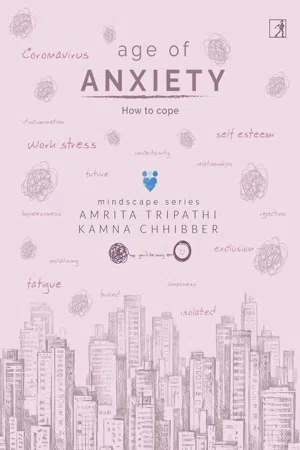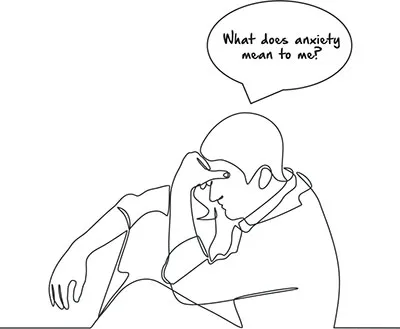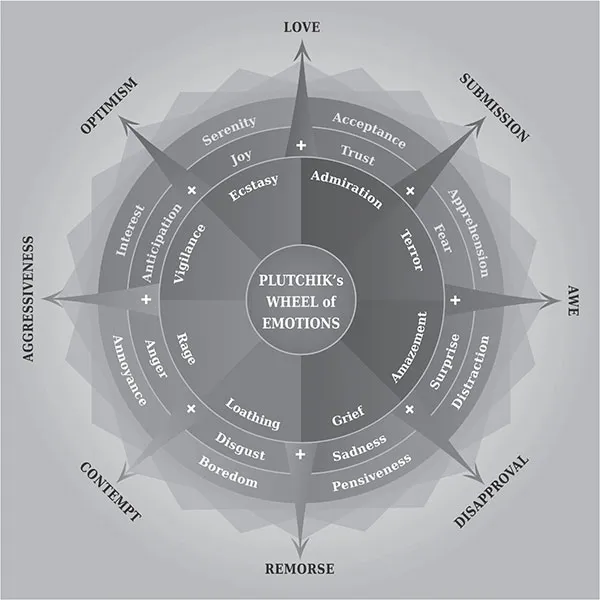![]()
PART ONE
![]()
WHAT IS ANXIETY?
Kamna Chhibber
Answering the question 'What is Anxiety?' is difficult. Every individual has their own conceptualisation of what it means to be anxious. Before we start delving into what it would mean to be anxious and having an Anxiety Disorder from a clinical perspective, let's start by asking our own selves this question.
Take a piece of paper and jot down for yourself what you understand anxiety to mean at this moment when you are reading this line. Also make a note of some of the situations where you think you feel anxious. You can use words or phrases or write full sentences or even a paragraph to make this note for yourself.
Now ensure you keep this paper with yourself. Don't lose it. We'll be using this paper/note later during the course of the book as you navigate its different parts. You can also use the blank side on the following page to make this note for yourself.
We also asked a few people we know to share their initial first thoughts with us on how they conceptualise anxiety. We are keeping their responses anonymous as per their request. Here are a few of the responses that we received:
For me anxiety is the absolute worst feeling. It is synonymous with being out of control of my body, and my mind. I fail to function when I get into anxious phases. And I have noticed once I do get anxious it stays with me for a while. This hasn't always been the case. And even now for me anxiety can happen for brief periods such as for a few minutes, or it can even, last up to hours and sometimes even go on to extend into days!
— 24-YEAR-OLD WOMAN, WORKING AT A COMPANY
Anxiety was when I used to give exams. I would have the worst feeling descend upon me like it was life or death. If I failed to perform it was as though the whole world would come crashing down and nothing could be fine after it. Obviously that was never the case. When things didn't go well nothing did come crashing down but that was — and even now in situations where I am being evaluated, is — the absolute worst I can feel.
— 35-YEAR-OLD MAN, BANKING EXECUTIVE
Anxiety has been my friend. I feel that when I have gotten anxious it actually helped me avert a bad situation. I don't know if that is all that good because people around me also complain that I am over-cautious. I do feel that to an extent I am like that. I do assess situations a lot more than others I know do and I can get stuck before I can take a decision but I can't always make up my mind on whether it is all good or all bad.
— 28-YEAR-OLD MAN, MANAGEMENT EXECUTIVE
When I get stressed, I start developing these aches and pains. My limbs hurt, sometimes my face and head. I have even had an upset stomach often times. And in general my stomach can be doing somersaults when I am anxious. It is the worst feeling ever and I do feel like I need immediate help at that time. It can get really bad for me.
— 39-YEAR-OLD WOMAN, IT PROFESSIONAL
When you consider all these descriptions, what is most evident is the underlying theme of experiencing physical symptoms which can potentially create extreme discomfort, as well as thoughts that can seem to spiral out of control. The situations are variable and different people can experience anxiety in different situations in the same way or even different ways.
If we were to try and define what Anxiety is, the following is a good way to conceptualise and understand it:
Anxiety is experienced by every individual. It is the anticipation of future threat. It is characterized most commonly as a diffuse, unpleasant, vague sense of apprehension, often accompanied by autonomic symptoms such as headache, perspiration, palpitations, tightness in the chest, mild stomach discomfort, and restlessness indicated by an inability to sit or stand still for long. The particular constellation of symptoms present during Anxiety tends to vary among persons.
— SADDOCK, SADDOCK & RUIZ2 (2015)
Anxiety, in fact, acts like a signal that indicates to the individual the possibility of an impending danger. It allows people to be able to take precautions and instate measures to be able to deal with the threat effectively. It is different from the fear that can get triggered within you in the face of danger. Fear is an emotional response that occurs when there is a real, known, external, definite source of threat. In contrast, Anxiety is triggered in response to an anticipated, unknown and vague stimulus.
It is important to understand these subtle differences as they enable you to be able to label correctly what you are experiencing in a given situation. Often, individuals are in fact feeling fear in a real situation that they find themselves in, but mislabel it as Anxiety.
Our minds are trained to also look at Anxiety as a much 'bigger thing/experience' and one that is indicative of a possibly larger issue. This can make you feel even more excessively worried and trigger even more intense feelings of anxiousness within you.
Now go back to the note that you made about what Anxiety means to you and the situations you identified that make you feel anxious. Utilising your understanding of what Anxiety is, and how it can be differentiated from fear, reassess and re-evaluate whether what you have felt in these situations was Fear or Anxiety. This process of reappraising the emotions you have felt and the situations you have experienced will help you develop a better understanding of the anxiety you feel. When you are equipped with this knowledge you would feel empowered to change the narrative that runs in your mind about how you think and feel in situations. We would be exploring this more elaborately in the subsequent chapters.
We would now look at developing a better understanding of the kind of emotions you feel in situations before we go on to getting to know more about Anxiety Disorders.
Fear and Anxiety
Fear is an individual's response to a real threat within the environment. It is related to a known, definite, external source.
Anxiety is an alerting signal which warns an individual of impending danger or threat, enabling them to take measures in advance to deal with the threat.
UNDERSTANDING THE EMOTIONS YOU FEEL
People commonly experience a plethora of emotions across situations. It is important to be able to recognise, understand and remember the diverse emotional experiences that occur in given situations. For most, emotional vocabulary tends to be rather limited and there is a struggle to come up with precise words that can definitively indicate towards what one is feeling. Before we move forward, try this. Take a moment to reflect and consider the different words you use regularly to denote emotion. Make a list of these.
You are most likely to come up with a limited range of words that you typically use to express what you are feeling in situations. Mostly, you perhaps end up utilising words like sad, happy, angry, anxious, worried to refer to feeling states. Other emotional expressions such as disgust, guilt, disdain, despair, apprehension, may not often feature in the way you would describe your emotional state. Additionally, frequently people utilise expressions of physical experiences to indicate towards an emotional experience; such as when people refer to feeling tired.
Expanding your emotional vocabulary is a helpful starting point if you are looking towards building your emotional health. A limited vocabulary necessarily limits your ability to name and label your emotional experiences and thus even takes away from you being able to do something about it.
So what you can do is use the emotion chart provided on the next page as a ready reference to identify the emotion you are really experiencing. Also, remember that it is not black and white and you may end up identifying a few different words that more comprehensively describe how you feel.
![]()
MYTHS AND FACTS
Mental health related illnesses have long been plagued by many misconceptions and myths, which prevent people from talking about their experiences and seeking help from experts. The hesitation comes from the fear of not being understood, being misunderstood, misrepresented, judged or castigated for being weak or having deficient coping skills, that make it difficult to work through challenging circumstances.
Here are some more commonly held myths that are seen to be associated with Anxiety Disorders and which you must be aware of to ensure that they don't come in the way of seeking help and support for yourself or for those you know and love.
Myth: Stress and Anxiety Disorders are synonymous
Fact: When we specifically consider Anxiety Disorders, it is easy for people to feel confused about how it is different from the stress that can be experienced as one operates across different spaces. Stress happens in response to specific external triggers or situations which can be present in the short term or even long term. People can experience physical discomfort, emotional upheaval or psychological distress on account of the stressors in their lives. However, when there are persistent, excessive, intense worries that occur outside of the presence of a trigger or stressor in the environment and which create extreme discomfort for the individual it is termed as anxiety.
Myth: If I worry, it means I have an Anxiety Disorder
Fact: Worry is often used interchangeably with Anxiety though it bears significant differences from it. Worry is usually seen to be more related to what is happening in a person's mind, it is specific, can lead to mild distress, but is controllable and also can encourage problem solving as it is usually associated with more realistic situations. Anxiety in contrast is likely to lead to more intense, pervasive, difficult emotional, physiological and psychological experiences, tends to be more diffuse, leads to excessive distress, is less controllable and can relate to aspects that are not necessarily occurring in the present or at times not related to a real threat in the environment, thus lingering outside of the presence of a real situation.
Myth: If you have an Anxiety Disorder you must avoid situations that cause you to experience stress
Fact: The avoidance of situations or experiences that contribute towards your Anxiety contributes towards reinforcing it. It is a myth to believe that avoidance would make the Anxiety manageable. In contrast, it tends to diminish your confidence and takes away from your ability to believe that you can work through a difficult situation. It is important to avoid the avoidance and develop healthy coping mechanisms that can allow you to work through the stressors and anxiety-provoking situations that you encounter.
Myth: The causes for Anxiety Disorders are rooted in childhood and so a focus needs to be on working through these
Fact: It is important to remember that there is a biopsychosocial explanation that provides an under...




